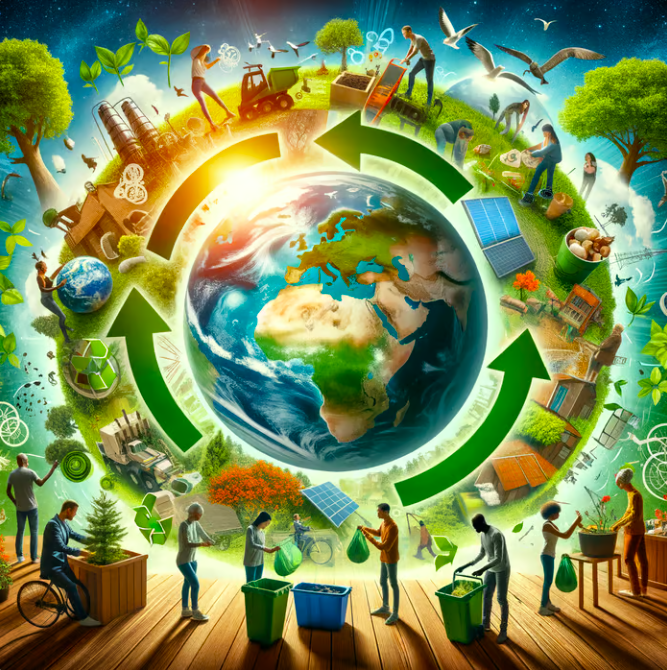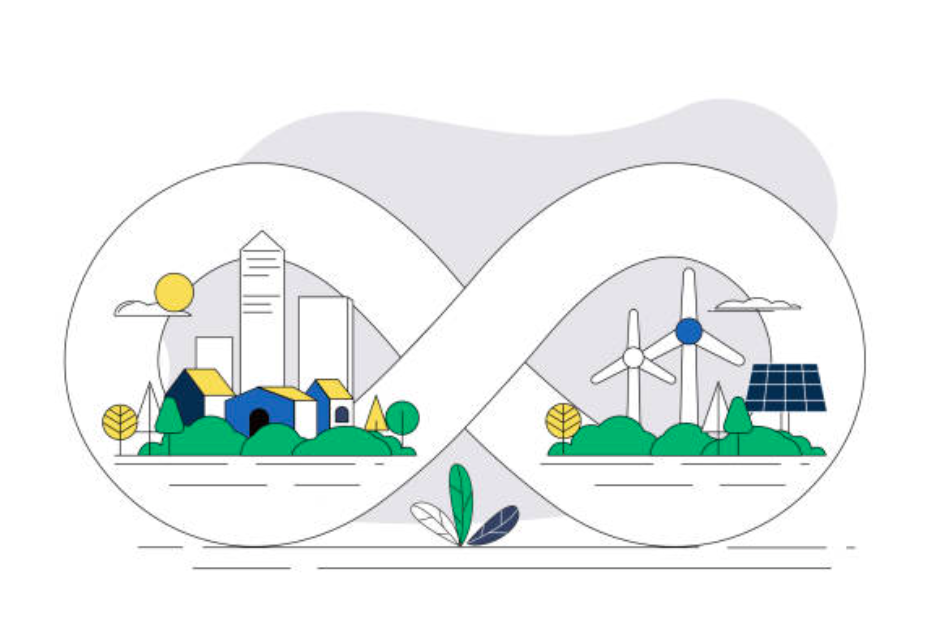What Would it Take to Build a Truly Green Economy?
Guy Dauncey, Co-Founder at West Coast Climate Action Network, discusses the logistics of building a sustainable green economy. Seven key areas are addressed, and the proposed changes include taxation for ecological harm, circular economy legislation, and community-based projects. The article emphasizes the need for a shift from profit-driven growth to ecological progress measurement.
What would it take to build a truly green economy, one in which all economic activity happened in harmony with nature and contributed to her restoration, rather than her destruction? An economy that could sustain itself for a million years?
Our current way of doing business is based on a selfish way of looking at the world that entirely ignores nature. Extract, produce, sell, discard. It labels any harm caused an ‘externality’, presumed to be someone else’s responsibility, and it allows a business to be a parasite on nature’s economy without ever having to pay the cost.
In the 18th and early 19th centuries piracy against shipping was common, until nations strengthened their navies and put an end to it. But we still exercise piracy against nature, robbing and stealing wherever we go. To end our modern piracy, we would need to make changes in seven areas.
- Restore a respectful relationship with the land and ocean
- End our ecological ignorance
- Develop a regulatory framework to protect Earth’s planetary boundaries
- Stop subsidizing harmful activities
- Make every business a champion for nature
- Build a circular economy
- Support the green economy in our communities
First, we would need to change our relationship to nature, and learn what it means to have a respectful relationship with the land and the waters. Locally, every landowner would need to engage in ecological restoration. Globally, every nation would need to fulfil its commitment to protect 30% and 30% of the ocean by 2030.
Second, we would need to end our widespread ecological ignorance. No more cabinet ministers and CEOs who can’t explain the carbon cycle. Immersion in nature would need to become part of every child’s schooling. In France, the Ministry of Ecological Transition is requiring that every public sector worker – 5.6 million people – will have been trained regarding the biodiversity crisis, the climate crisis, and the natural resources crisis by 2027, starting with senior executives1.
Third, we would need a regulatory framework with legislation and treaties to protect Earth’s nine planetary boundaries, as laid out by the Stockholm Resilience Centre2. These include the ozone layer, biodiversity loss, chemical pollution, greenhouse gases, the oceans, and freshwater systems. These would be backed up by an International Court of Environmental Justice, where crimes of ecocide and breach of the boundaries could be prosecuted. The new framework would need to be built into all trade agreements, with import tariffs being imposed on products that breached the planetary boundaries.

A Harming Nature Tax
We would need to back this up with legislation requiring companies to report on harm to nature caused by their activities, especially in nations where domestic legislation might be weak or non-existent. Businesses would be required to track and report on their harm. Ecological accountants would establish an agreed cost for each unit of harm; and businesses would pay the appropriate Harming Nature Tax. Products that cause no harm would pay no tax. The income would pay for ecological restoration. The True Cost Accounting Accelerator, an initiative of the Global Alliance for the Future of Food, is working with 200 businesses and partner organizations in thirty countries to develop this kind of reporting for food products3.
The new regulations would need to include finance. In a truly green economy banks would follow credit guidance from the Bank of Canada, such as not being allowed to advance loans that breach the planetary boundaries. Financing the expansion of fossil fuels in 2024 is as morally reprehensible as it would have been to finance the manufacture of tanks for sale to the Nazis in 1944. The Bank of Canada has the power to end this by removing central banking privileges from offenders such as the Royal Bank of Canada.
Fourth, governments would need to cease subsidizing harmful activities. Today, these amount to $700 billion a year to farmers, 90% of which harm nature4; $620 billion a year to fossil fuel companies; $320 billion a year to harmful water management practices; $155 billion a year to harmful forestry practices; and $20 billion a year to harmful fisheries practices.
“In a truly green economy banks would follow credit guidance from the Bank of Canada, such as not being allowed to advance loans that breach the planetary boundaries”
Guy Dauncey
Make Every Corporation a B Corp
Fifth, every business would need to assign someone to be its voice for nature. For larger companies, this would be a required seat at the board. We need to hobble the instinct to piracy, which in our capitalist economy is the instinct to maximize capital gains. One way to achieve this would be to require every business to adopt a social purpose charter, similar to a B Corporation, with penalties on companies which refuse such as being charged a higher rate of taxation and being shut out of government contracts, grants, loans, and export assistance.
Sixth, we would need to address our use of natural resources. A truly green economy would be circular, not linear. There would be no such thing as ‘waste’. Since the 1970s our use of resources has tripled, driving 90% of the world’s biodiversity loss. Globally, 70% of our wastes are either landfilled, or piled in open dumps. 10% is burnt, releasing toxic chemicals, and only 20% is ‘recycled’, for which I use quote-marks, since much ends up in the global south, where it is often abandoned or burnt. Too much of our plastic waste ends up in the ocean. A whole generation is growing up distressed by the sight of seals strangled by six-pack plastics, and albatross chicks dying with their stomachs full of plastic.
In a truly green economy the export of wastes would be banned, requiring them to be recycled either within their country of origin or within a partnership of geographically close nations. A hundred nations have agreed to abide by this (enshrined in the Basle Convention), but Canada is not among them5. This would oblige nations to get serious about building a circular economy. There could be a Circular Economy Scorecard for every product-line, starting with those that produce the most waste. The information could be integrated into each product’s digital passport and accessed via its QR code, a system already being developed for use in Europe6.
” A truly green economy would be circular, not linear. There would be no such thing as ‘waste’.”
Guy Dauncey
A Circular Economy Accountability Act
A Circular Economy Accountability Act would require repairability, reductions in packaging, and steadily increasing recycled content for all products. It would require every company to report on its aggregate circular economy score, and measures to increase it, as Scotland is doing7. It would levy a circular economy tax on major products, graded by their scorecards, using the revenue to pay for recycling or composting. Products that are easy to repair or recycle would carry no tax.
Various nations in Europe are heading in this direction. France has banned the destruction of unsold objects; required 100% recycling for all plastics by 2025; required the phasing-out of all single-use plastics by 2040; legislated the right to repair8; and embraced extended producer responsibility – that whoever creates a product is responsible for its demise. Major commercial sectors have to pay into an appliance repair fund; appliance producers have to provide spare parts and repair instructions; and manufacturers have to produce new eco-design plans every five years to cut their resource use and improve their recyclability9.

Switzerland has created a Circular Hub through which they plan to entirely decouple profit from the consumption of finite resources10. Denmark is working on what the British green entrepreneur John Elkington calls “a wildly ambitious green transformation”11. Amsterdam is aiming to half its use of raw materials by 2030 and become fully circular by 205012. The Circular Economy Club, founded in London by Anna Tari, has 7,000 members and 280 local clubs in 140 countries13.
For Earth as a whole, the data would feed into a Global Circular Economy Scorecard. When Andreas Mayer and colleagues looked at the European Union, they found that in 2014, 7.4 gigatons of materials were processed within the EU, of which 0.71 Gt were secondary materials, giving a 9.6% circularity score. Of the 4.8 Gt of outflows (waste), only 14.8% were recycled or downcycled14.
The organization Circle Economy produces an annual Circularity Gap Report in collaboration with Deloitte. In 2024, they reported that the 2023 global circularity rate decreased from 9.1% in 2018 to 7.2%. They revealed that in just the last five years, we collectively consumed 500 billion tonnes of materials – almost as much as in the entire 20th century15.
Finally, we would need to support the new green economy in our communities by undertaking multiple projects to restore nature, and by growing more food, using 100% renewable energy, living more simply, eating far less beef, living in smaller homes, consuming much less with zero waste, doing more local manufacturing, sharing much more, becoming skilled at mending and repairing, and building community wealth instead of financial wealth. In other words, living within Kate Raworth’s doughnut economy. To support this, we’d need a new social contract to reduce inequality and ensure that people had sufficient income, and a host of related changes, but that’s for another time.
Do changes such a this require ‘degrowth’? There’s a well-established movement of people who believe that it does16, but endless economic growth is not the cause of our troubles. It is the result. The cause is the assumed primacy of capital gain, the selfish investors who demand never-ending growth because it will bring them never-ending profits. To blame economic growth is to blame the result, not the cause, and to let the perpetrators off the hook.
In place of GDP (Gross Depletion of the Planet) we should be measuring Ecological Civilization Progress (ECP), tracking it with a dashboard of indicators. New Zealand, Iceland, Scotland, Wales, Finland, and Canada have made a start by forming the Wellbeing Economy Governments partnership, but in general, our greedy, destructive, piracy-against-nature economy still rules17. The Cinderella of our new ecological civilization has yet to find her recycled glass slipper.
Guy Dauncey works to develop a positive vision of a sustainable future, and to translate it into action. He lives on Vancouver Island. He is co-founder of the BC Sustainable Energy Association and the West Climate Climate Action Network. He is the author or co-author of ten books. His latest, “The Economics of Kindness: Moving from a Selfish Economy to a Cooperative Economy” will be published in summer 2024 by Palgrave Macmillan. In 2023 he was awarded a Clean 50 Lifetime Achievement Award. His website is www.thepracticalutopian.ca
[1] Climate Clarity: https://climateclarity.co.uk/french-state-training/
[2] Planetary Boundaries: https://www.stockholmresilience.org/research/planetary-boundaries.html
[3] True Cost Accounting Accelerator: https://tcaaccelerator.org
[4] Subsidies: https://www.theguardian.com/environment/2019/sep/16/1m-a-minute-the-farming-subsidies-destroying-the-world and https://www.theguardian.com/environment/2021/sep/14/global-farm-subsidies-damage-people-planet-un-climate-crisis-nature-inequality
[5] Ban on export of wastes: https://www.theglobeandmail.com/canada/article-banning-plastic-waste-exports-wont-solve-the-worlds-plastic-trash-woes/
[6] Digital Product Passports: https://www.bbc.com/news/business-68283317
[7] Scotland: https://www.gov.scot/publications/delivering-scotlands-circular-economy-proposals-legislation/
[8] Right to Repair. https://repair.eu/news/major-steps-taken-for-durability-and-right-to-repair-in-france/
[9] France: https://www.theguardian.com/commentisfree/2023/jun/24/environment-france-emmanuel-macron-crisis-uk
[10] Switzerland: https://www.cetransition.ch
[11] Denmark: https://mfvm.dk/publikationer/publikation/pub/hent-fil/publication/strategy-for-circular-economy/
[12] Amsterdam: https://www.amsterdam.nl/en/policy/sustainability/circular-economy/
[13] Circular Economy Club: https://www.circulareconomyclub.com
[14] https://onlinelibrary.wiley.com/doi/full/10.1111/jiec.12809
[15] https://www.circularity-gap.world/2024
[16] The Future is Degrowth: A Guide to a World Beyond Capitalism. Matthais Schmelzer, Andrea Vetter, Aaron Vansintjan.
[17] Wellbeing Economy Governments http://weall.org/wego














